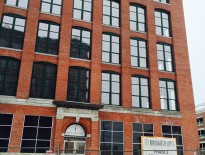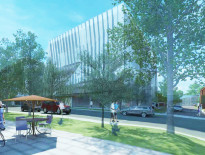
Storage space in Lowell’s Mill No. 5 complex is being converted into a fashion and apparel manufacturing co-working makerspace called New Vestures.
Co-working spaces give fledgling tech companies access to low-cost, low-commitment real estate while they develop products and seek expansion funding.
The success of the co-working model isn’t lost on state economic development officials seeking to revive entrepreneurialism in Massachusetts’ 26 economically struggling Gateway Cities. The shared space model, they hope, can launch the careers of artisans recolonizing former mills and theater troupes rehearsing in once-vacant storefronts.
MassDevelopment’s award of $850,000 to support co-working expansion in Gateway Cities in 2015 is starting to bear fruit. Performing arts and makerspaces are scheduled to open this spring in Chelsea and Lowell after using grant funds to renovate commercial properties, attracting growing communities of creative types with a hands-on approach. Smaller grants are being used to study the potential for programs in Holyoke, Lawrence, Pittsfield, Quincy and Springfield.
Former textile manufacturing powerhouse Lowell is the primary beneficiary of the initial funding round. In May, the Lowell Makes collaborative will expand from its basement workshop into ground-floor retail space after receiving $162,000 for fit-out. The new storefront will show off the group’s wares, from custom-made clocks to furniture to cosplay gear.
Co-founder John Noto had never heard of the term “makerspace” in 2013, but he sensed untapped demand for a shared work environment where engineers, artists and inventors could work in downtown Lowell. Lowell Makes now has 78 members.
For Noto, a physicist and president of Chelmsford-based weather instrument company Scientific Solutions, the impetus was partially lifestyle-driven: after moving to downtown Lowell, he missed having a basement workshop.
“We have all these empty-nesters in Lowell who sold their suburban houses and moved to downtown. That’s when we found out these things were called makerspaces,” he said.
The new co-working spaces give landlords a chance to reactivate underutilized real estate by bringing early-stage companies together under the same roof, where they share equipment and ideas.
Noto and co-founders Eric Sack and the late Kamal Jain modeled the space on Somerville’s nonprofit fabrication center, Artisan Asylum, and rented a low-cost basement space at 47 Lee St. from developer Nick Sarris. Most of the equipment has been donated by members or the community, including a woodshop, leather shop and laser cutters. Collaborations with Lowell’s art community have grown, with artists using the equipment to design tech-inspired apparel.
Like the office co-working model, industrial “makerspaces” generally run on a membership basis. Basic memberships at Lowell Makes are $50 a month, including access to unassigned hot desks and equipment. The space also includes a classroom and conference room.
The projected May opening of a storefront on Merrimack Street will raise Lowell Makes’ profile and give members a permanent gallery to show off their wares.
At the opposite end of the downtown, Diana Jaye Coluntino is building out space in Lowell’s Mill No. 5 complex for a fashion and apparel-themed co-working space called New Vestures after receiving a $150,000 MassDevelopment grant.
Coluntino was artistic director of the Lowell Revolving Museum, an artist community that moved to Lowell after being displaced by gentrification in Boston’s Fort Point, until its closure in 2013. A former professor at Massachusetts College of Art, Coluntino saw a fashion-related makerspace as a positive afterschool outlet for local youths and a way to tap into rising demand for American-made goods.
“Places like Lowell all suffered from manufacturing going overseas. This is what drove me: I wanted to start making clothes again,” she said. “Where we are in the Mill City, it would be great to reignite the industrial revolution again.”
Jim Lichoulas, owner of the Mill No. 5 complex on Mill Street, had already converted the fourth floor into an independent theater and retail space for local vendors, from vinyl record shops to customized popcorn vendors. Coluntino credits Lichoulas for focusing on commercial development, bringing new businesspeople to the downtown area.
“Jim wasn’t just slapping up walls and putting in more condos and apartments making money. He really wanted to create a beautiful space,” she said.
Storage space on the fifth floor is being converted into the New Vestures’ makerspace, with 30 industrial sewing machines and room for 20 member designers who can rent space by the day, week or month. And collaboration will extend beyond Mill No. 5’s brick walls: Coluntino anticipates there will be opportunities to tap into Lowell Makes’ expertise on designs incorporating technology such as LEDs.
The opportunity to reawaken local entrepreneurship is particularly relevant in Lowell, where forces of globalization hollowed out the once-robust manufacturing economy.
“If small businesses rise out of this, all the better,” she said. “It really is part of the creative economy: keeping money flowing in a particular place allows it to grow and spiral outward.”
Dramatic Changes In Chelsea
In Chelsea, a $250,000 grant is designed to revitalize the downtown theater scene. Apolinnaire Theatre Co. is expanding its home base at the former Odd Fellows Hall on Winnisimmet Street that it has owned and occupied since 1999. The 1906 building has been a magnet for various theater troupes displaced from downtown Boston by the real estate boom, said Trip Venturella, Apollinaire’s development and outreach director. Outside groups rent space for rehearsals, film shoots and acting classes.
Apolinnaire is using the grant money to renovate three storefronts and build a black box theater for guest groups and its youth program. Many of the groups currently rely on “found spaces” for performances, meaning they approach landlords and ask to use dance studios or office building lobbies for free.
“All of these companies are doing performances wherever they can, and not necessarily in adequate spaces,” Venturella said.
Total project costs are approaching $1 million, Venturella said, and the MassDevelopment grant is being augmented with individual donations, a $100,000 city grant and a cash-out refinancing on the property.
The project meshes with the city’s strategic plan to market Chelsea Square as a cultural mecca. Venturella’s contemporary theater company stages outdoor performances at Chelsea’s Port Park during the summer, and the city is seeing an influx of residents from new upscale multifamily developments such as Boston-based Gate Residential’s 230-unit One North of Boston.
“There’s a lot more focus in downtown specifically since this is all happening at the theater, and it’s gotten a lot of people excited in our area as a cultural district,” Venturella said.




 |
| 

